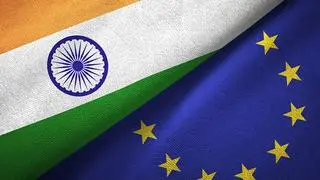To protect domestic industry against surge in imports once tariffs are brought down under the proposed Regional Comprehensive Economic Partnership (RCEP) pact, India has suggested an auto trigger method that would automatically increase import levies once shipments cross a given threshold limit.
“New Delhi will push for the acceptance of its proposal on auto trigger as a provisional safeguard measure against import surges at the crucial negotiating round of the 16 RCEP countries, that has started in Jakarta,” an official familiar with the matter told BusinessLine .
The country’s negotiating team will also fight against the proposed inclusion of the controversial investor-state dispute settlement (ISDS) in the pact by members like Japan and Singapore, argue for a strict rules of origin (ROO) clause to stop third country imports, demand better offers in services and try and extend protection to a number of sensitive dairy and farm items and industrial goods, the official added.
Most RCEP members, which includes the 10-country ASEAN, China, Japan, South Korea, India, Australia and New Zealand, are looking at concluding the negotiations for RCEP in November this year.
The on-going negotiating round in Jakarta is important as it would give inputs for the meeting of RCEP Trade Minister in September where the final shape for the ambitious pact is to be given.
“India is doing its bit in convincing members that despite their ambitions to eliminate duties in almost all items being traded within the proposed zone (over 90 per cent of items), the country has to protect the interests of its sensitive sectors as it could affect livelihoods of millions of people in the country. It is not possible for India to match the market access ambitions of many others, including China,” the official said.
India’s proposal for auto trigger of safeguard duties on imports is one of the ways the country thinks it can accord some protection to its local industry in case there is a flood of imports once duties or eliminated or reduced for RCEP members.
“It takes a long time to impose regular safeguard duties when there is a surge in imports as procedures have to be followed. By the time the duties are in place it can cause a lot of damage in the local market. The auto trigger could provisionally raise duties automatically the moment imports increase beyond a given level,” the official explained.
New Delhi also does not want an ISDS mechanism in RCEP as it does not want its domestic laws to be challenged in offshore arbitral tribunals. “As a middle path some countries have proposed that ISDS be put off for a while and implemented some years after the RCEP is implemented. India, however, is opposed to that as well,” the official said.
- To protect domestic industry, the ‘auto trigger’ mechanism will ensure that import levies are raised if there is a flood of imports
- India is opposed to the proposed dispute settlement body as it does not want its domestic laws to challenged outside India
- India is pushing for stringent norms for ‘Rules of origin’ to prevent goods being routed through nations with lower duties
Rules of Origin (ROO) is yet another area where India is fighting members such as China and many ASEAN members who want relaxed rules. India wants stringent rules for ROO as it is apprehensive that in case it gives greater concession to some members in terms of market access in goods, items from other countries such as China could come into India routed through those countries at reduced duties.
“The issues that still remain unresolved are most crucial and the RCEP pact can’t be finalised without a resolution of these. India will stay firm on its stand that it will not be hurried into an agreement despite fixed deadlines,” the official said.
The RCEP could be the largest free trade zone in the world once signed as member countries account for 25 per cent of global GDP, 30 per cent of global trade, 26 per cent of global foreign direct investment flows and 45 per cent of the total population.








Comments
Comments have to be in English, and in full sentences. They cannot be abusive or personal. Please abide by our community guidelines for posting your comments.
We have migrated to a new commenting platform. If you are already a registered user of TheHindu Businessline and logged in, you may continue to engage with our articles. If you do not have an account please register and login to post comments. Users can access their older comments by logging into their accounts on Vuukle.